CalAIM is California's new program designed to transform Medi-Cal, the state's health care program that provides free and low-cost insurance to some of its most vulnerable residents.
Californians are paying billions of dollars into CalAIM, which includes new and “enhanced” solutions to address what state leaders describe as “the whole person,” the medical and social needs of patients. It also includes “care management'' (ECM) benefits.
But in an exclusive interview with NBC Bay Area Investigations, a nurse currently employed by Contra Costa Health Plan (CCHP), a medically managed care plan, said the county's version of the ECM ignored medical needs and He said it was inflating the number of cases and harming patients. .
“It's heartbreaking because we were supposed to be helping these patients,” she said.
The nurse, who asked not to be identified, said she faced severe retaliation for attempting to report concerns about patient harm or death.
“I was taken to a closed room and yelled at. I was told I shouldn't be asking these questions,” she said. “A patient who had a diabetic ulcer on his foot ended up in the hands of non-medical and non-clinical staff and they did not address the issue. A systemic infection developed and the foot was amputated. I needed to.”

The whistleblower said the incident was not unique to that incident, nor was it the employee's fault. Incidents like this occur regularly through Contra Costa Health's enhanced care management program, she said. And this is despite California Department of Health Services (DCHS) documents stating that her ECM benefits from CalAIM “meet clinical and non-clinical needs.”
In Contra Costa County, a nurse and three other officials familiar with the managed care plan said the county's ECM program has completely abandoned medical assistance.
They explained that ECM's case managers were nurses who had already been working at Contra Costa Health before ECM's inception, but were now working on issues such as access to shelter and fresh food for members. They say they have been instructed to focus solely on social needs. or non-clinical/non-medically qualified staff, such as housing specialists or community health workers, who are not trained to properly refer medical issues to appropriate medical staff.
“We've been told that if you don't understand what a health condition is, just Google it. If you don't understand the words on your doctor's note, you can Google it. …It’s very dangerous,” the nurse said.
When asked if he had first-hand knowledge of patients who died as a result of this problem, the whistleblower replied: yes i will. “

One of the deaths she alerted Contra Costa health supervisors and county officials to involved a patient who complained of being unable to get out of bed, according to internal emails reviewed by the department. Non-clinical staff unknowingly labeled the patient as bedridden, and the rest of the care team treated the patient as such, with only telephone consultations. As a result, the patient was unable to get out of bed for months, and the pressure sores turned into bone infections. He later died, according to an email to her superiors.
Another Contra Costa Medical Enhancement Management patient she emailed said there was “no discussion of health needs.” [or] Health intervention” will continue for one year. While clearly ill, he was “on the verge of death” and “subsequently passed away.” [a] 1 month later. ”
“I tried hard to report this internally, but both of those concerns were dismissed. And I was also subjected to extreme hostility and abusive treatment.,” she said.
NBC Bay Area reached out to Contra Costa Health executives, including CEO Anna Ross. They all declined interview requests from this news organization. Kim McCaul, the health system's communications director, declined to discuss specific cases or staff members, citing privacy concerns, and agreed to his sit-down interview.
“Unfortunately, these very complex cases often have very advanced disease progression,” McCarl says.
Contra Costa Health ECM When asked if patients can have their medical needs addressed through ECM, Mr. McCarl responded, “Yes. Except ECM is part of the overall care model…Contra Costa County is what's called an integrated system. We have a whole clinical department and his whole ECM department. So we don't have to have the ECM program provide clinical care because our clinic system does that. ”

But that's not always the case, and cases can sometimes be missed, according to a 2023 audit of Contra Costa Health by the California Department of Health Services. The State Department expanded the scope of the audit after receiving anonymous complaints.
State regulators found that patients “complained of not receiving enhanced care management services.” In one case, “a comprehensive medical history and physical examination were not completed.” Without proper evaluation, the regulator said, patients “may be left without important behavioral and medical health examinations that can help identify and prevent disease.”
Regulators also found significant supervisory issues. Contra Costa Health hasn't had a required compliance officer for more than a year. The health system told the state that CEO Anna Ross “has assumed responsibility for notifying the board of compliance activities.” But regulators found that the meeting minutes “showed no discussion or report,” and the board was not informed of the state's previous audit results.
When the Division of Investigation contacted the state for comment on the matter, DCHS spokesperson Anthony Cava said in an email that “both clinical and non-clinical needs…need to be addressed by the ECM team. ” he repeated.
When our team sought clarification and provided details to DCHS about the whistleblower's concerns and what Contra Costa Health said was not providing clinical care through ECM, another state department spokesperson Leah Meyers responded.
“DHCS will continue to monitor the implementation and delivery of CCHP’s ECM benefits to ensure that CCHP remains compliant with DHCS’ ECM policy,” Myers said.
The whistleblower said he had no confidence in the state's response, especially given that billions of taxpayer dollars were involved.
NBC Bay Area confirmed with the state that Contra Costa Health received a combined $2.5 billion in Medi-Cal revenue in 2022 and 2023. Of that amount, he spent $56 million on enhanced care management services.
The nurse said she is concerned that the medical cutbacks will allow Contra Costa Health to report more patients to the state and obtain more funding.
“It gives them an excuse to actually inflate the caseload, because it's OK to ignore the clinical needs. Managing just the social needs of 100 patients is completely It’s manageable,” she said.
Contra Costa Health denies that serving more Medi-Cal ECM members means more funding for the system.
“It's up to the state to actually decide how we get paid,” McCarl said. “Therefore, it is not in our economic interest to increase their numbers.”
If something inappropriate happens, the Contra Costa Health Department could have difficulty identifying and reporting the problem to the state.
At the end of the audit period, six of the system's seven anti-fraud positions were vacant, as were the compliance officer and manager positions. That's why whistleblowers can't remain silent, he said.
“I took an oath to my community and as a nurse to advocate for my patients,” she said.
In Costa Contra County, a new state medical benefit called Enhanced Care Management is being criticized for ignoring medical needs, sources familiar with the system tell NBC Bay Area. Candice Nguyen reports.
Investigative reporter Candice Nguyen led this reporting. If you would like to contact her about this issue or have another investigative tip, please email her at candice.nguyen@nbcuni.com.


